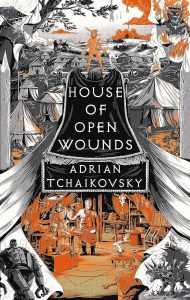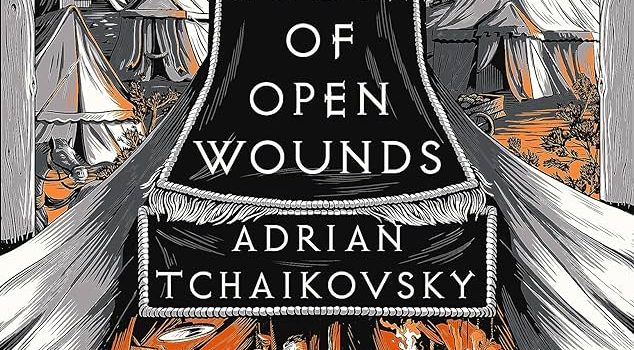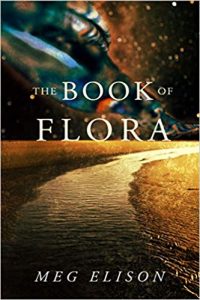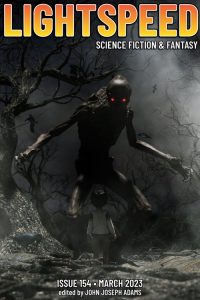Jake Casella Brookins Reviews House of Open Wounds by Adrian Tchaikovsky
 House of Open Wounds, Adrian Tchaikovsky (Head of Zeus 978-1-0359-0138-8, $27.99. 608pp, hc) December 2023. Cover by Joe Wilson.
House of Open Wounds, Adrian Tchaikovsky (Head of Zeus 978-1-0359-0138-8, $27.99. 608pp, hc) December 2023. Cover by Joe Wilson.
Although it is set in the same world as City of Last Chances, Adrian Tchaikovsky’s House of Open Wounds is very much a standalone sequel. The previous novel introduced us to a large cast of characters in Telmark, a formerly independent nation conquered by the aggressively expanding Palleseen Sway. Among those characters – and the only one to appear in this novel – was Yasnic, last priest of a healing god. Fleeing persecution and probable deicide, Yasnic – redubbed Maric Jack – finds himself recruited into a motley crew of healers and battlefield medics in the Palleseen army. The ideologically motivated Palleseen are opposed to irrational magic of all kinds, but aren’t above some leeway if it keeps their soldiers alive. Along with the other misfits in the hospital unit, Jack struggles to survive, and to somehow stay true to his ideals, while caught up in the cogs of a vast military machine.
Like its predecessor, House of Open Wounds is a mosaic novel, with chapters told from a range of perspectives across its sizable cast. Tchaikovsky is particularly deft at using this technique: This novel doesn’t feel like it’s forcibly hopping heads in order to flesh out one unified plot. Instead, it genuinely feels like it’s sampling, almost a sociological study of a moment, a movement, in which the characters do not in fact agree on what’s happening or what’s most important. And the range and substance of his characters here are delightful – scheming necromancers, irreverent irregulars, orphan priests of gods with strange powers.
I really enjoyed the world of this novel, how it all works – a fantasy world, to be sure, but one that’s in an early industrial age, and one whose magic is yielding to forces of empire and rationality. The Palleseen ‘‘decant’’ the magic they encounter – including that found in local gods – into a sort of all-purpose energy that powers their machinery and weapons; there’s a particularly poignant subplot here about Divinati healing magic, based on a careful sense of cosmic balance, being perverted into a weapon of war. Many of the technological-magical flourishes here reminded me pleasantly of Robert Jackson Bennett’s work, as well as China Mieville’s (City of Last Chances particularly showed the influence of The Scar, I thought).
House of Open Wounds, though, with its social concerns and its keen ambivalence about technological progress, constantly brought Pratchett to mind. Small Gods is obviously a touchstone, with Jack literally carrying around a little house for the much-diminished deities he encounters, and dwindling faith and disrupted communities are a major theme, but the Pratchett connection feels even deeper. Not just so much the humor of Discworld – though there is a nicely understated comedy in much of Tchaikovsky’s work here, particularly in the character juxtapositions he engineers – but the way that Pratchett often seems to be balancing a sense of decency with a sense of righteous rage. Because, fun worldbuilding and colorful characters aside, House of Open Wounds is about the injustice of war, about the mechanisms of empire and appropriation, about what happens to people caught up in them.
Where the setting of City of Last Chances somewhat distracted from this aspect, House of Open Wounds takes place in thinly described venues: Jack and his cohort are just focused on staying alive, and keeping others alive if they can, in a confusing-but-constant world of tents and orders. And, where City of Last Chances presented us with an occupation in the context of a politically complicated, morally grey city with its own long histories, House of Open Wounds situates its story almost entirely in the field, with a war being fought between two superpowers, neither of whom garners sympathy. This focuses narrative attention on the empire itself, the effects of perpetual war-making – the way it reinforces hierarchies and racism, how it rewards channelized greed, how it reduces and perverts noble impulses.
Ranged against these forces of violence is just – Maric Jack and his friends, trying to survive, trying to find a way out of an impossible system. There’s something kind of fascinating about that, and in how the novel constantly circles questions of complicity and noncompliance, rather than some grand plot to defeat the giant evil empire – there’s a whiff of Heller’s Catch-22 in the novel’s focus on survival in absurd and horrific circumstances. Jack’s God, in a semihumorous mechanic that grows ever more serious as the book continues, is able to heal anyone of deadly wounds, but with a caveat: if they engage in violence ever again, their wounds will instantly reappear – leaving a growing number of soldiers figuring out how to be pacifists. All the contradictions and hypocrisies confronted here are not so stark as that, but that theme – of trying to figure out how to completely change, or how to stay true to an idea in a fundamentally hostile environment – resounds throughout every character.
There’s much more to this novel than I can sketch here – Tchaikovsky once again turns an apparent door-stopper into a page-turner, crammed with interesting asides and memorable scenes. More practically, less romantically than many fantasies, it’s a novel pondering disenchantment – how industrial (or military-industrial) forces strip away wonder from the natural world, and wondering what re-enchantment would look like; and, although it’s not as vocally anti-imperial as many recent speculative works, it does a fantastic job of situating the horror of empire and of war in the personal, in the banality of going along with a horrific system. Quietly humorous and hopeful, House of Open Wounds hit me hardest in how it prioritizes healers over warriors.
Jake Casella Brookins is from the Pennsylvania Appalachians, and spent a fantastic amount of time in the woods. He studied biology, before switching over to philosophy & literature, at Mansfield University. He’s been a specialty coffee professional since 2006. He’s worn a lot of coffee hats. He worked in Upstate New York and Ontario for about 8 years. He’s been in Chicago since 2013; prior to the pandemic, he worked for Intelligentsia Coffee in the Loop. Starting in 2021, he’s been selling books at a local indie bookstore. He lives with his wife, Alison, and their dogs Tiptree & Jo, in Logan Square.
This review and more like it in the February 2024 issue of Locus.
 While you are here, please take a moment to support Locus with a one-time or recurring donation. We rely on reader donations to keep the magazine and site going, and would like to keep the site paywall free, but WE NEED YOUR FINANCIAL SUPPORT to continue quality coverage of the science fiction and fantasy field.
While you are here, please take a moment to support Locus with a one-time or recurring donation. We rely on reader donations to keep the magazine and site going, and would like to keep the site paywall free, but WE NEED YOUR FINANCIAL SUPPORT to continue quality coverage of the science fiction and fantasy field.
©Locus Magazine. Copyrighted material may not be republished without permission of LSFF.








